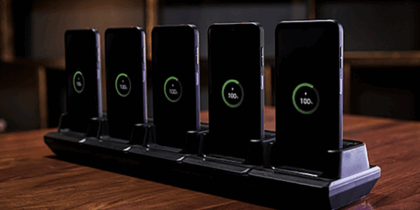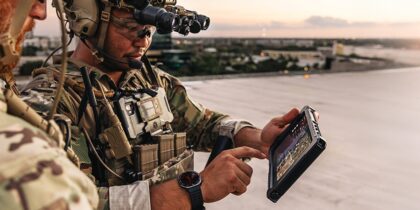With its multilevel approach to mobile security, Samsung Knox protects the integrity of the entire device, from the hardware to the application layer, while its signature container solution keeps work and personal data separate.
That’s what the end user sees. Behind the scenes, though, there’s even more going on. The casual user may not take note of Knox’s compliance with Department of Defense standards, but that compliance strategy is fundamental to the success of the platform. By making the deliberate choice to pursue a military-grade phone, the Samsung security team created not just a security solution, but a pervasive security ecosystem.
The defense community sets a high bar when it comes to mobile security. Here’s how its defense-grade certification has helped hone the Samsung Knox platform.
Making the Grade
In terms of specific requirements, Samsung Knox meets the Mobile Operating System Security Requirements Guides (SRGs) as published by the Defense Information Systems Agency (DISA). SRGs guide the development of Security Technical Implementation Guides (STIGs), which document specific product policies and requirements as well as best practices for configuration. Having met the DISA requirements, Samsung’s Knox-empowered devices became the first consumer mobile devices in the nation validated to handle the full range of classified information.
In addition, Knox conforms to the demands of the Federal Information Processing Standards (FIPS), as published by the National Institute of Standards and Technology (NIST). This critical requirement certifies such elements as credentialing, key management and crypto-management. Knox also complies with the National Information Assurance Partnership (NIAP), which oversees evaluations of commercial IT products for use in national security systems.
To address defense requirements for durability, Samsung has also obtained IP68 certification indicating a level of water- and dust-resistance for many of its flagship smartphones, while the Galaxy S7 active — its most durable device — is tested against the Mil-STD-810G specifications to ensure it will perform in tough environments in the field.
Defense-Grade Security Out of the Box
Because it’s defense-grade compliant, Knox ensures that a military-grade phone will be ready to deliver a complete security solution out of the box. Rather than having to worry about complicated setup procedures, elaborate implementations and idiosyncratic execution, system operators can turn to Knox’s defense-grade platform as a sure indication that it will support all needed capabilities right from the get-go.
Moreover, Knox’s commitment to defense standards has given rise to a comprehensive system that moves beyond the operating system to secure the hardware, boot layer, kernel and application layer, while other solutions typically stop at the OS.
At the same time, Knox solutions deliver a strong measure of flexibility. Users can tap into the Knox Customization SDK to customize the look and feel of a device, and even manage the performance of applications, all in an environment preapproved for classified information.
Premium Productivity
Too often, security in the mobile realm comes at a cost to productivity. The same systems intended to safeguard data and networks can bog down users in a jumble of pass codes and protocols. But the military standard is clear: Security can’t come at the expense of usability. By complying with a military-grade expectation, Knox demonstrates an ability to deliver not just a secure mobile ecosystem, but a tough smartphone with a user experience that sacrifices nothing when it comes to productivity.
Knox’s ability to deliver this enhanced productivity comes from the fact that it’s not just a product, but rather a platform — one that encompasses all aspects of security. It’s not uncommon these days for an enterprise user to pack as many as half a dozen security products onto a mobile device: products to secure VPNs and firewalls, manage encryption or stymie keylogging. Such a diverse array of solutions can seriously degrade device performance, hindering productivity. As a security platform, Knox delivers the needed safeguards without all the bloat there to degrade performance.
The Right Fit
Security doesn’t happen in a vacuum. For any given set of users, there’ll be a specific range of needs depending on the type of information in play and the perceived risks. For those seeking defense-grade security, whether in government or industry, this holds especially true. To ensure Knox is honed to meet the specific needs of the defense-grade community, the Knox team has worked in close collaboration with representatives from government, defense and elsewhere, including security officials from more than half a dozen nations, in order to understand their missions and objectives.
“The U.S. government is always willing to tell vendors what is needed to complete the mission,” says Keith Fuentes, who leads Samsung’s Knox sales team. “When we heard what these government agencies were saying, we actually listened.”
Transparency
When it comes to security, many providers shy away from the notion of transparency, afraid that giving others an inside look will somehow compromise their solutions. Samsung has taken the opposite approach. By seeking out DISA-level approvals, Samsung has agreed to make Knox entirely transparent, conducting frank and open discussions about the mechanisms, procedures and methodology underlying the system.
This commitment to transparency has helped to strengthen Knox, especially in terms of its responsiveness to the end user community. Because defense-grade users in government and industry are given a clear and open understanding of the Knox approach, they’re able to proceed with a greater sense of assurance as they engage in security implementations. This commitment to clarity is a vital part of the Knox platform.
When Samsung announced the development of the Knox platform, there was some skepticism in the analyst community. Some wondered whether a defense-grade approach was even necessary, while others questioned whether it would be feasible. But that conversation has since reversed. Government and industry leaders alike have increasingly taken the position that Knox’s defense-grade approach creates a sense of certainty and reassurance in the realm of mobile security, at a time when such peace of mind has been hard to find.
At the same time, the Knox team has shown that by working in close collaboration with government, and by delivering transparent solutions, it’s possible to craft a security ecosystem that delivers the highest degree of protection while at the same time ensuring uninterrupted productivity.
Learn more about how Knox can provide your organization with military-grade security without sacrificing productivity.








